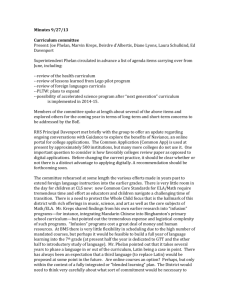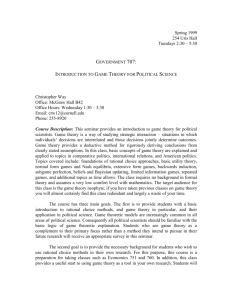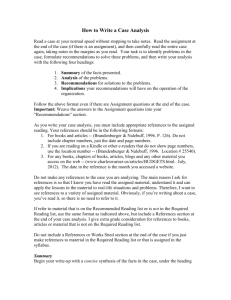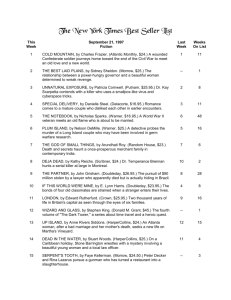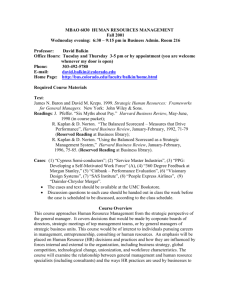game2
advertisement
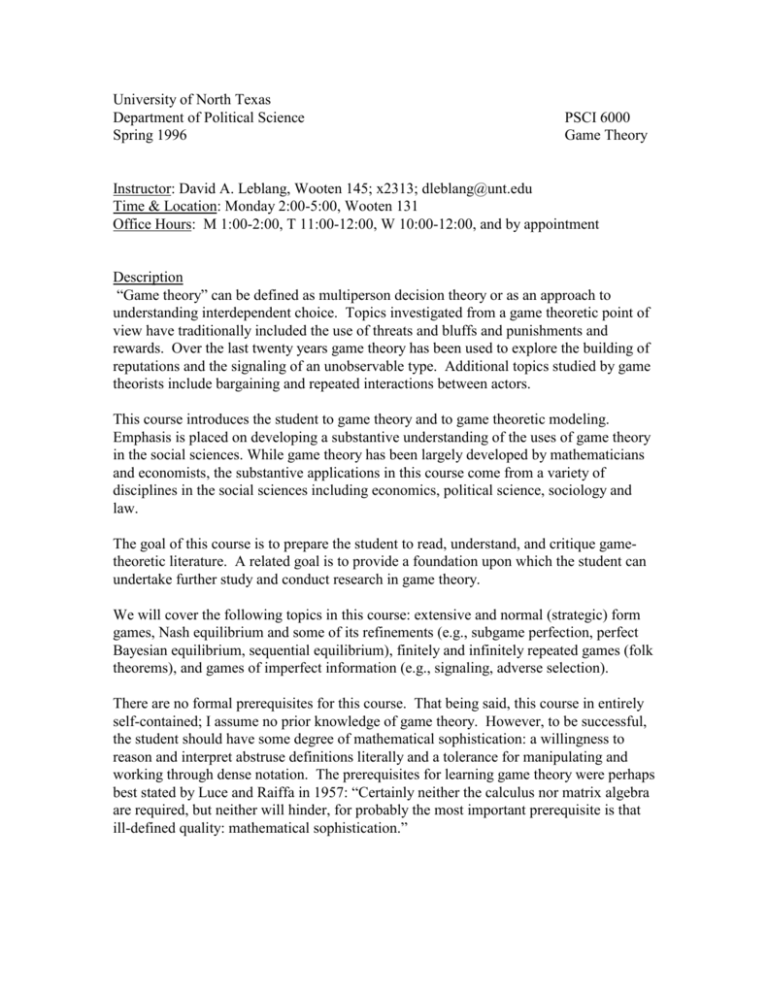
University of North Texas Department of Political Science Spring 1996 PSCI 6000 Game Theory Instructor: David A. Leblang, Wooten 145; x2313; dleblang@unt.edu Time & Location: Monday 2:00-5:00, Wooten 131 Office Hours: M 1:00-2:00, T 11:00-12:00, W 10:00-12:00, and by appointment Description “Game theory” can be defined as multiperson decision theory or as an approach to understanding interdependent choice. Topics investigated from a game theoretic point of view have traditionally included the use of threats and bluffs and punishments and rewards. Over the last twenty years game theory has been used to explore the building of reputations and the signaling of an unobservable type. Additional topics studied by game theorists include bargaining and repeated interactions between actors. This course introduces the student to game theory and to game theoretic modeling. Emphasis is placed on developing a substantive understanding of the uses of game theory in the social sciences. While game theory has been largely developed by mathematicians and economists, the substantive applications in this course come from a variety of disciplines in the social sciences including economics, political science, sociology and law. The goal of this course is to prepare the student to read, understand, and critique gametheoretic literature. A related goal is to provide a foundation upon which the student can undertake further study and conduct research in game theory. We will cover the following topics in this course: extensive and normal (strategic) form games, Nash equilibrium and some of its refinements (e.g., subgame perfection, perfect Bayesian equilibrium, sequential equilibrium), finitely and infinitely repeated games (folk theorems), and games of imperfect information (e.g., signaling, adverse selection). There are no formal prerequisites for this course. That being said, this course in entirely self-contained; I assume no prior knowledge of game theory. However, to be successful, the student should have some degree of mathematical sophistication: a willingness to reason and interpret abstruse definitions literally and a tolerance for manipulating and working through dense notation. The prerequisites for learning game theory were perhaps best stated by Luce and Raiffa in 1957: “Certainly neither the calculus nor matrix algebra are required, but neither will hinder, for probably the most important prerequisite is that ill-defined quality: mathematical sophistication.” Recent game theoretic work requires (at a minimum) a familiarity with probability theory, mathematical expectation and basic calculus. We will have two or three additional (“bonus”) classes to cover the basics of set theory, probability theory, Bayes’ theorem and single variable calculus. These classes will be scheduled at a time convenient to all participants. These additional classes are not optional; if you do not attend these classes the probability that you will fully grasp the game-theoretic material will approach zero. Requirements 1. Classroom Discussion: It is the student’s responsibility to be prepared to discuss the information and claims found in the readings and to think about the related research possibilities. Learning game theory (or any formal theory for that matter) is like studying a foreign language: it is cumulative. You cannot understand equilibrium refinements, for example, if you do not understand the concept of an equilibria. If you don’t ask questions then I must assume that the material is clear. (10%). 2. Problem Sets: there will be four or five problem sets over the course of the semester. These problem sets are very important for your understanding of the course material. I fully expect that you will turn in all of the assignments; failure to do so will result in a zero. Late assignments will not be accepted. (40%). 3. Article Review: you will select a game-theoretic article from any sub-field within political science and write a review. This review will follow the style of book reviews in the APSR. It should include a discussion of the contributions and limitations of the article as well as proposed directions for future research. You should clear the article with me before you begin to write your review. (15%) DUE: April 15. 4. Research Prospectus and Design: you will write a complete research design for possible paper. In this design you will indicate: (i) the theoretical issue/problem/ question that is of interest to you; (ii) the relevant (game-theoretic and non-game-theoretic) literature that has addressed this question; (iii) your theoretical approach (e.g., your hypothesis); (iv) the game-theoretic model you will employ; and (v) your expected findings. (35%) DUE: Monday, May 6. 2 The following have been ordered and should be available in the bookstore: Alt, James and Kenneth Shepsle (eds.). 1990. Perspectives on Positive Political Economy. Cambridge: Cambridge University Press. Baird, Douglas, et al. 1995. Game Theory and The Law. Cambridge: Harvard Banks, Jeff and Eric Hanushek (eds.). 1995. Modern Political Economy. Cambridge: Cambridge University Press. Binmore, Ken. 1990. Fun and Games. New York: Heath. Dixit, Avinash and Barry Nalebuff. 1989. Thinking Strategically. NY: WW Norton. Gates, Scott and Brian Humes. Forthcoming. Games, Information, and Politics: Applying Game Theoretic Models to Politics. Ann Arbor: University of Michigan Press. [Manuscript available at the copy shop] Hargreaves Heap, Shaun, et al. (eds.). 1992. The Theory of Choice: A Critical Guide. Cambridge: Blackwell. Kreps, David. 1990. A Course in Microeconomic Theory. Princeton: Princeton University Press. Morrow, James. 1994. Game Theory for Political Scientists. Princeton: Princeton University Press. Rasmusen, Eric. 1995. Games and Information, Second Edition. Cambridge: Blackwell. The required readings will be assigned from Dixit & Nalebuff, Gates & Humes, and Rasmusen. These three books will serve as the core material for this course. Binmore and Kreps provide more rigorous discussions of the material. Morrow is written for political scientists; it is an excellent source of applications and bibliographic references. Baird is a text that applies game theory to the study of legal issues. Alt & Shepsle and Banks & Hanushek are collections of essays in the area of positive political economy; these essays trace where positive political economy has been and where it is going. Hargreaves Heap is a survey of choice theoretic models ranging from individual choice to interdependent choice to collective choice. It also includes a very useful glossary. You should also get your hands on a good probability and statistics text. Some econometrics books have short chapters on probability theory. I recommend Amemiya, Introduction to Statistics and Econometrics; Kmenta, Elements of Econometrics, Second Edition; Hogg and Tanis, Probability and Statistical Inference, Fourth Edition; and Freund and Simon, Modern Elementary Statistics, Eighth Edition. 3 1. Introduction Overview and history of game theory; Rational choice theory, utility, risk, preferences; Modeling competitive situations, rules of the game. Required Reading Rasmusen, Introduction, 1.1; Dixit & Nalebuff, Introduction, Ch 1. Optional Material Kreps, pp.3-14, 17-37, 71-86, 98-131, 355-63; Binmore, Introduction, pp.67-139; 146-74; Morrow, Chs 1-2. Background and Applications Aldrich, John. 1993. “Rational Choice and Turnout,” American Journal of Political Science, 37:246-78. Riker, William. 1990. “Political Science and Rational Choice,” in Alt and Shepsle (eds). Perspectives on Positive Political Economy. NY: Cambridge University Press. Machina, Mark. 1987. “Choice Under Uncertainty: Problems Solved and Unsolved.” Journal of Economic Perspectives, 1:121-54. 2. Games in Normal/Strategic Form 2.1 Specifying a game; Dominant strategies: strong v. weak; Dominant strategy equilibrium; Nash equilibrium. Required Reading Rasmusen, Chapter 1; Dixit & Nalebuff, Ch 3. Optional Material Kreps, pp. 376-380, 387-406; Morrow, chapter 4. Background and Applications Bates, Robert. 1983. “The Preservation of Order in Stateless Societies: A Reinterpretation of Evans-Pritchard’s The Neur.” In Essays on the Political Economy of Rural Africa. Berkeley: University of California Press. Geddes, Barbara. 1991. “A Game Theoretic Model of Reform in Latin American Democracies.” American Political Science Review 85:371-92. 4 2.2 Mixed Strategies; Reaction curves; Probability theory, expectation, lotteries; Interpretation, comparative static. Required Reading Rasmusen, 3.1-3.3; Dixit & Nalebuff, Ch. 7. Optional Material Kreps, pp.380-84, 387-406; Binmore, chapter 7; Morrow, chapter 4. Background and Applications Debreu, G. 1952. “A Social Equilibrium Existence Theorem.” Proceedings of the National Academy of Sciences, 886-93. 2.3 Modeling strategies. Required Reading Gates and Humes, Chapter 3, pp.91-96; Baird, Chapter 1. 3 Games in Extensive Form 3.1 Rules of the Game; Information (perfect, complete, etc.). Required Reading Rasmusen, 2.1-2.2; Kreps, pp.363-376; Dixit & Nalebuff, Ch 2. Optional Material Binmore, chapter 1; Morrow, chapter 3 Background and Applications Przeworski, Adam. 1991. “Transitions to Democracy,” Chapter 2 in Democracy and the Market: Political and Economic Reform in Eastern Europe and Latin America. NY: Cambridge University Press. Kuhn, H. 1953. “Extensive Games and the Problem of Information,” in H.W. Kuhn and A.W. Tucker, eds. Contributions to the Theory of Games II. Princeton: Princeton University Press. 5 3.2 Backwards induction; Subgame perfection. Required Reading Rasmusen, 4.1-4.3; Dixit & Nalebuff, Ch. 6 Optional Material Kreps, pp.417-425; Morrow, chapter 5. Background and Applications Baird, chapter 2 Zagare, Frank. 1990. “Rationality and Deterrence.” World Politics 42:238-60. Reny, Philip. 1992. “Rationality in Extensive-Form Games.” Journal of Economic Perspectives 6:103-118. 4. Repeated Games 4.1 Rules; Discounting; Complete and symmetric information. Required Reading Rasmusen 4.5-4.6, Gates and Humes, chapter 4; Dixit & Nalebuff, ch 4. Optional Material Kreps, chapter 14; Morrow, chapter 9 Background and Applications Rider, Robert. 1993. “War, Pillage, and Markets.” Public Choice 75:149-56. Baird, chapter 5 4.2 Finitely repeated games, “Gang of Four” model, Axelrod’s Tournament. Required Reading Rasmusen, 5.1-5.3, 6.4-6.5 Optional Material Kreps, chapter 14; Morrow, chapter 9 Background and Applications Kreps, D., P. Milgrom, J. Roberts, and R. Wilson. 1982. “Rational Cooperation in the Finitely Repeated Prisoners Dilemma,” Journal of Economic Theory 27:245-52. Benoit, J.P and V. Krishna. 1985. “Finitely Repeated Games,” Econometrica 317-20. Axelrod, Robert. 1984. The Evolution of Cooperation. NY: Basic Books. 6 5. Bayesian Equilibria. Conditional probability and Bayes’ theorem; Updating beliefs; Perfect Bayesian Equilibria; Behavioral strategies. Required Reading Rasmusen, 2.1-2.4; Morrow, chapter 6 Background and Applications Geanakoplos, John. 1982. “Common Knowledge,” Journal of Economic Perspectives 6:53-82. Kilgour, D. Marc and Frank C. Zagare. 1991. “Credibility, Uncertainty, and Deterrence,” American Journal of Political Science 35:305-34. Nalebuff, Barry. 1991. “Rational Deterrence in an Imperfect World. World Politics. 43:313-35. 6. Perfect and Sequential Equilibrium. Weak dominance; Trembling-hand perfect equilibria; Sequential equilibria. Required Reading Rasmusen, 6.1-6.3; Gates and Humes, chapter 5. Optional Material Kreps, pp.425-443; Morrow, chapter 7. Background and Applications Baird, chapter 3 Selten, R. 1975. “Reexamination of the Perfectness Concept for Equilibrium points in Extensive Games.” International Journal of Game Theory 25-55 Kreps, D. And R. Wilson. 1982. “Sequential Equilibria.” Econometrica, 863-94. 7. Asymmetric Information. Complete v. Incomplete information; Out-of-equilibrium beliefs, restrictions on beliefs; Cheap talk; Moral hazard, adverse selection, signaling; Pooling v. Separating. Required Reading Rasmusen, chapters 7-10; Gates and Humes, chapter 6. Optional Material Kreps, chapters 13, 16-17; Morrow, chapter 8; Baird, chapter 4. 7
